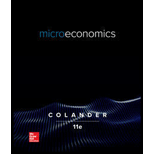
Microeconomics
11th Edition
ISBN: 9781260507041
Author: Colander, David
Publisher: MCGRAW-HILL HIGHER EDUCATION
expand_more
expand_more
format_list_bulleted
Question
Chapter 16, Problem 3QE
To determine
X-inefficiency and the perfect competitor.
Expert Solution & Answer
Want to see the full answer?
Check out a sample textbook solution
Students have asked these similar questions
Please solve this, no words or explanations.
Please solve this, no words or explanations.
17. Given that C=$700+0.8Y, I=$300, G=$600, what is Y if Y=C+I+G?
Chapter 16 Solutions
Microeconomics
Ch. 16.1 - Prob. 1QCh. 16.1 - Prob. 2QCh. 16.1 - Prob. 3QCh. 16.1 - Prob. 4QCh. 16.1 - Prob. 5QCh. 16.1 - Prob. 6QCh. 16.1 - Prob. 7QCh. 16.1 - Prob. 8QCh. 16.1 - Prob. 9QCh. 16.1 - Prob. 10Q
Ch. 16 - Prob. 1QECh. 16 - Prob. 2QECh. 16 - Prob. 3QECh. 16 - Prob. 4QECh. 16 - Prob. 5QECh. 16 - Prob. 6QECh. 16 - Prob. 7QECh. 16 - Prob. 8QECh. 16 - Prob. 9QECh. 16 - Prob. 10QECh. 16 - Prob. 11QECh. 16 - Prob. 12QECh. 16 - Prob. 1QAPCh. 16 - Prob. 2QAPCh. 16 - Prob. 3QAPCh. 16 - Prob. 4QAPCh. 16 - Prob. 5QAPCh. 16 - Prob. 6QAPCh. 16 - Prob. 1IPCh. 16 - Prob. 2IPCh. 16 - Prob. 3IPCh. 16 - Prob. 4IPCh. 16 - Prob. 5IPCh. 16 - Prob. 6IPCh. 16 - Prob. 7IPCh. 16 - Prob. 8IPCh. 16 - Prob. 9IPCh. 16 - Prob. 10IPCh. 16 - Prob. 11IP
Knowledge Booster
Similar questions
- Use the Feynman technique throughout. Assume that you’re explaining the answer to someone who doesn’t know the topic at all. Write explanation in paragraphs and if you use currency use USD currency: 10. What is the mechanism or process that allows the expenditure multiplier to “work” in theKeynesian Cross Model? Explain and show both mathematically and graphically. What isthe underpinning assumption for the process to transpire?arrow_forwardUse the Feynman technique throughout. Assume that you’reexplaining the answer to someone who doesn’t know the topic at all. Write it all in paragraphs: 2. Give an overview of the equation of exchange (EoE) as used by Classical Theory. Now,carefully explain each variable in the EoE. What is meant by the “quantity theory of money”and how is it different from or the same as the equation of exchange?arrow_forwardZbsbwhjw8272:shbwhahwh Zbsbwhjw8272:shbwhahwh Zbsbwhjw8272:shbwhahwhZbsbwhjw8272:shbwhahwhZbsbwhjw8272:shbwhahwharrow_forward
- Use the Feynman technique throughout. Assume that you’re explaining the answer to someone who doesn’t know the topic at all:arrow_forwardUse the Feynman technique throughout. Assume that you’reexplaining the answer to someone who doesn’t know the topic at all: 4. Draw a Keynesian AD curve in P – Y space and list the shift factors that will shift theKeynesian AD curve upward and to the right. Draw a separate Classical AD curve in P – Yspace and list the shift factors that will shift the Classical AD curve upward and to the right.arrow_forwardUse the Feynman technique throughout. Assume that you’re explaining the answer to someone who doesn’t know the topic at all: 10. What is the mechanism or process that allows the expenditure multiplier to “work” in theKeynesian Cross Model? Explain and show both mathematically and graphically. What isthe underpinning assumption for the process to transpire?arrow_forward
- Use the Feynman technique throughout. Assume that you’re explaining the answer to someone who doesn’t know the topic at all: 15. How is the Keynesian expenditure multiplier implicit in the Keynesian version of the AD/ASmodel? Explain and show mathematically. (note: this is a tough one)arrow_forwardUse the Feynman technique throughout. Assume that you’re explaining the answer to someone who doesn’t know the topic at all: 13. What would happen to the net exports function in Europe and the US respectively if thedemand for dollars rises worldwide? Explain why.arrow_forward20. Given the mathematical model below, solve for the expenditure multiplier for a) government spending, G; and b) for consumer taxes, T. (medium difficulty) Y=C+I+G C=Co+b(Y-T) 1 = 10 T=To+tY G = Go+gYarrow_forward
- Use the Feynman technique throughout. Assume that you’re explaining the answer to someone who doesn’t know the topic at all: 11. What exactly is a rectangular hyperbola and what relevance is it to classical economics?arrow_forwardUse the Feynman technique throughout. Assume that you’re explaining the answer to someone who doesn’t know the topic at all: 9. Explain the difference between absolute and comparative advantage in a family setting, i.e.using parents and children. What can we glean from knowing about comparative andabsolute advantages?arrow_forwardUse the Feynman technique throughout. Assume that you’re explaining the answer to someone who doesn’t know the topic at all: 18. Explain why most economists believe it is absolutely necessary to allow free trade in aneconomy. Why is it harmful (under most circumstances) to have tariffs and trade barriers?arrow_forward
arrow_back_ios
SEE MORE QUESTIONS
arrow_forward_ios
Recommended textbooks for you

 Economics (MindTap Course List)EconomicsISBN:9781337617383Author:Roger A. ArnoldPublisher:Cengage Learning
Economics (MindTap Course List)EconomicsISBN:9781337617383Author:Roger A. ArnoldPublisher:Cengage Learning

 Managerial Economics: A Problem Solving ApproachEconomicsISBN:9781337106665Author:Luke M. Froeb, Brian T. McCann, Michael R. Ward, Mike ShorPublisher:Cengage Learning
Managerial Economics: A Problem Solving ApproachEconomicsISBN:9781337106665Author:Luke M. Froeb, Brian T. McCann, Michael R. Ward, Mike ShorPublisher:Cengage Learning Microeconomics: Principles & PolicyEconomicsISBN:9781337794992Author:William J. Baumol, Alan S. Blinder, John L. SolowPublisher:Cengage Learning
Microeconomics: Principles & PolicyEconomicsISBN:9781337794992Author:William J. Baumol, Alan S. Blinder, John L. SolowPublisher:Cengage Learning


Economics (MindTap Course List)
Economics
ISBN:9781337617383
Author:Roger A. Arnold
Publisher:Cengage Learning



Managerial Economics: A Problem Solving Approach
Economics
ISBN:9781337106665
Author:Luke M. Froeb, Brian T. McCann, Michael R. Ward, Mike Shor
Publisher:Cengage Learning

Microeconomics: Principles & Policy
Economics
ISBN:9781337794992
Author:William J. Baumol, Alan S. Blinder, John L. Solow
Publisher:Cengage Learning